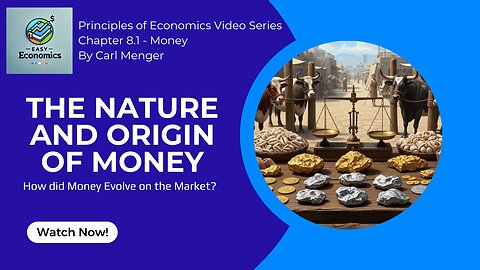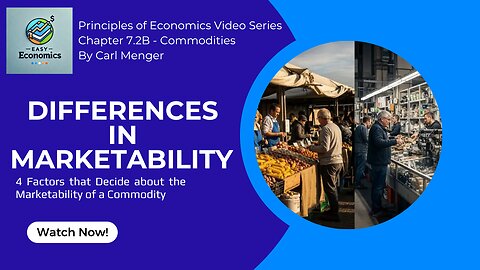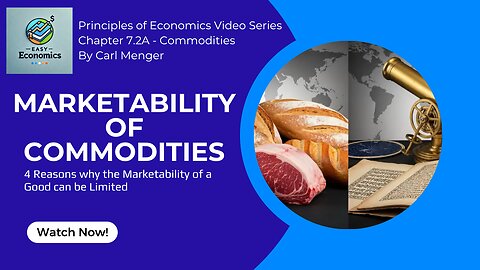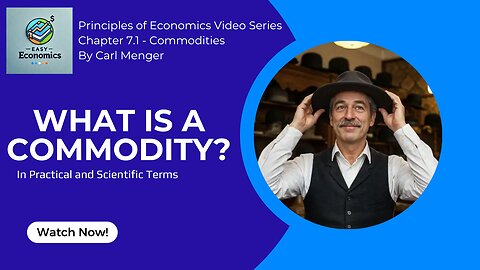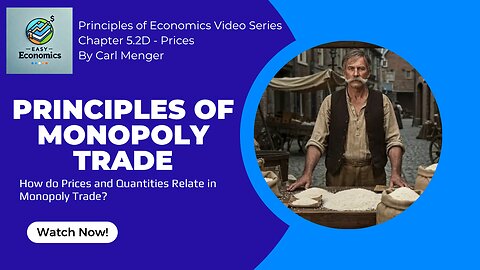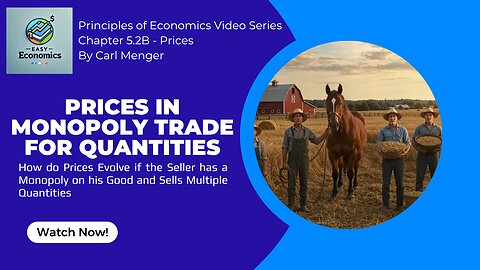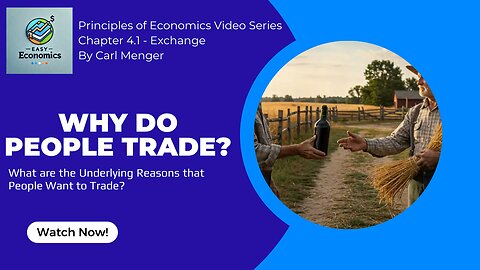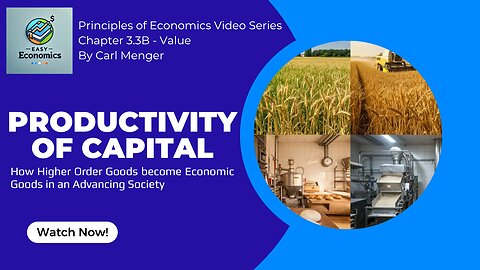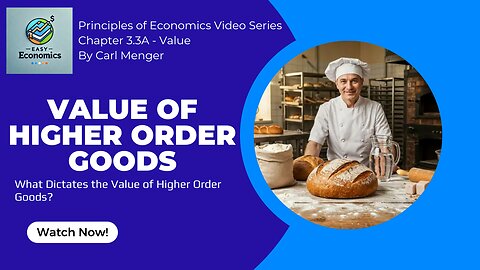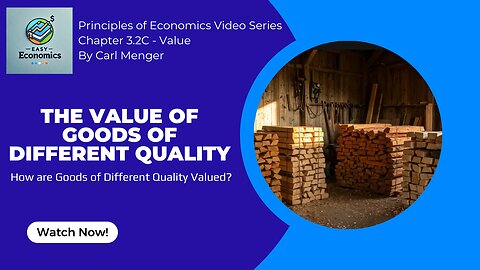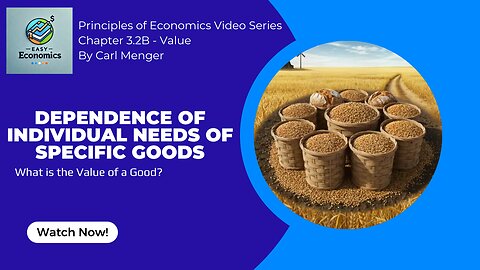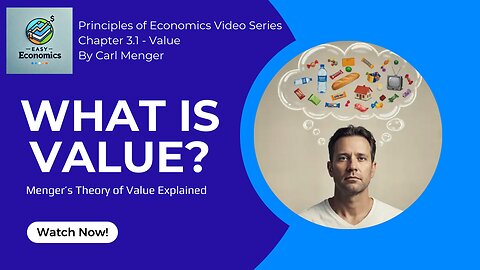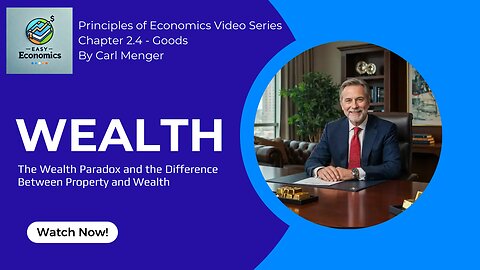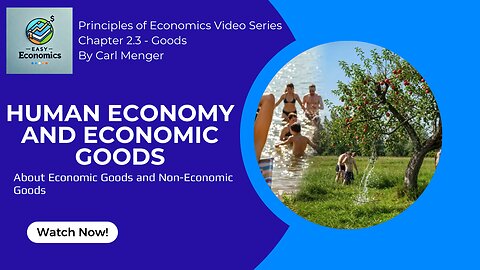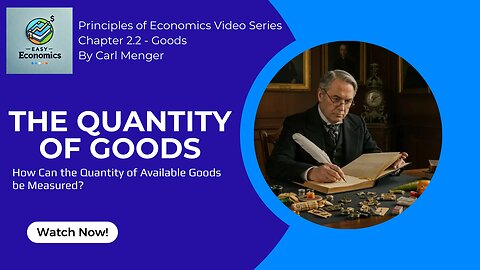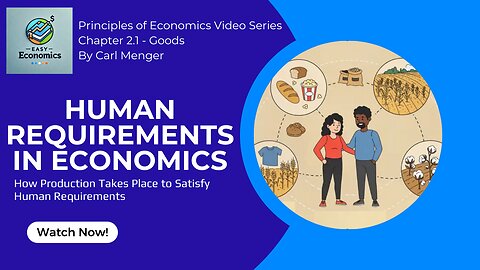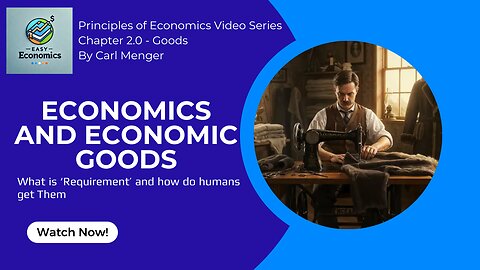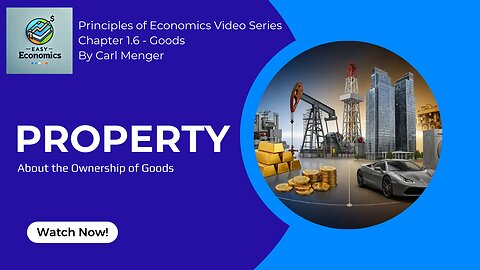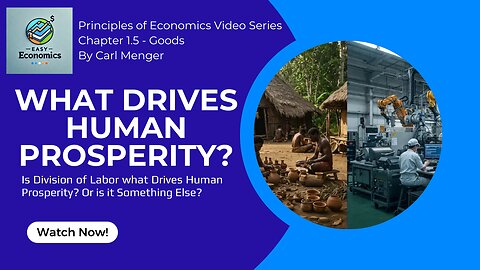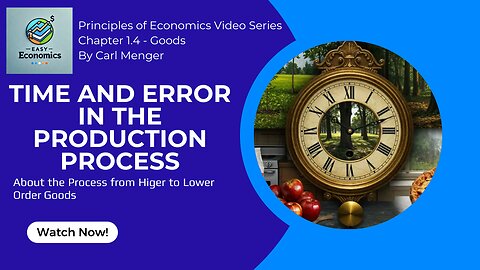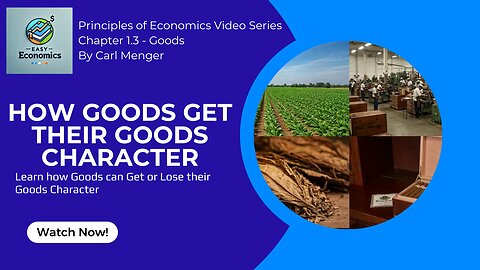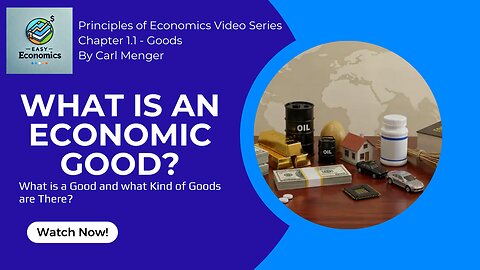Premium Only Content
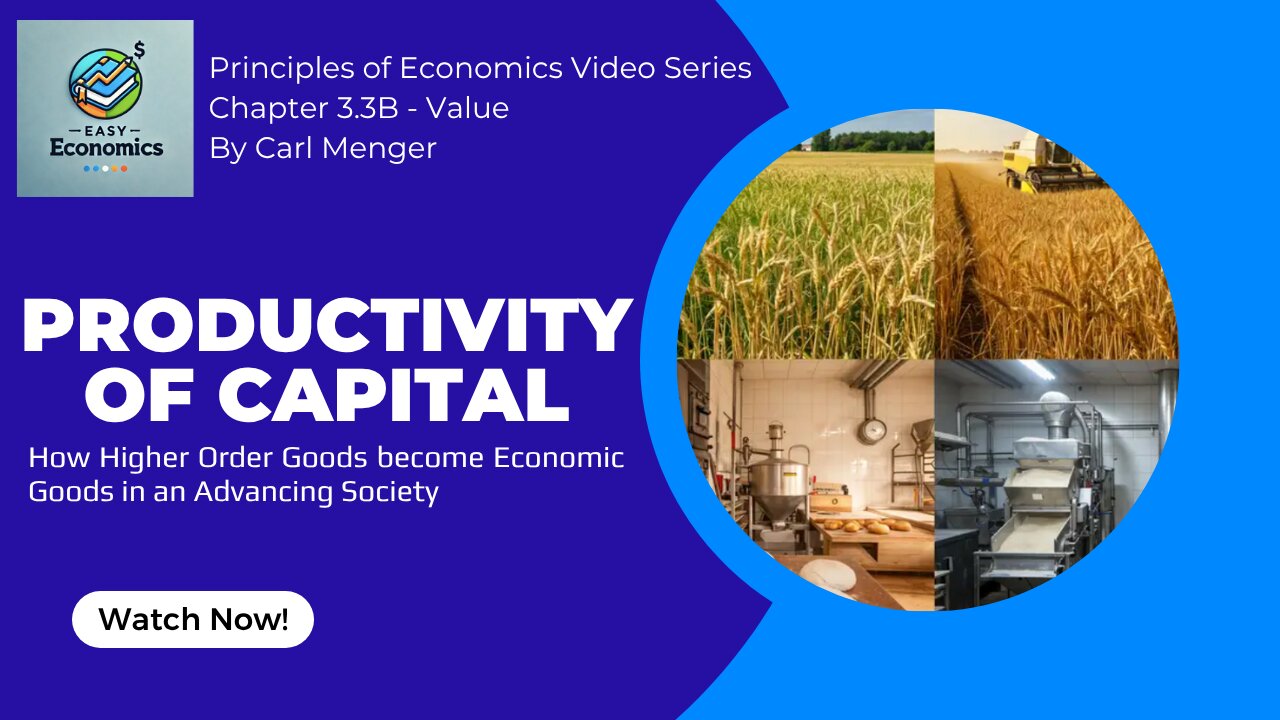
Principles of Economics by Carl Menger Chapter 8.1 - The Nature and Origin of Money
Principles of Economics by Carl Menger Chapter 7.2C - Circulability of Commodities
Principles of Economics by Carl Menger Chapter 7.2B - Differences in Marketability of Commodities
Principles of Economics by Carl Menger Chapter 7.2A - Marketability of Commodities
Principles of Economics by Carl Menger Chapter 7.1 - What is a Commodity?
Principles of Economics by Carl Menger Chapter 5.3C - Competition Policy
Principles of Economics by Carl Menger Chapter 5.3B - Price Formation by Competing Sellers
Principles of Economics by Carl Menger Chapter 5.3A - Price Forming and Distribution by Competition
Principles of Economics by Carl Menger Chapter 5.2D - Principles of Monopoly Trade
Principles of Economics by Carl Menger Chapter 5.2C - Market Dynamics of Monopoly Pricing
Principles of Economics by Carl Menger Chapter 5.2B - Price Forming in Monopoly Trade for Quantities
Principles of Economics by Carl Menger Chapter 5.2A - Price Formation in Monopoly Trade
Principles of Economics by Carl Menger Chapter 5.1 - Price Formation in Isolated Exchange
Principles of Economics by Carl Menger Chapter 5.0 - The Theory of Price
Principles of Economics by Carl Menger Chapter 4.2 - The Limits of Economic Exchange
Principles of Economics by Carl Menger Chapter 4.1 - Foundations of Economic Exchange
Principles of Economics by Carl Menger Chapter 3.3E - The Value of Land, Labour and Capital
Principles of Economics by Carl Menger Chapter 3.3D - The Value of Individual Higher Order Goods
Principles of Economics by Carl Menger Chapter 3.3C - Combined Value of Higher Order Goods
Principles of Economics by Carl Menger Chapter 3.3B - The Productivity of Capital
Principles of Economics by Carl Menger Chapter 3.3A - What Causes the Value of Higher Order Goods?
Principles of Economics by Carl Menger Chapter 3.2D - The Subjective Nature of the Measure of Value
Principles of Economics by Carl Menger Chapter 3.2C - Influence of the Quality of Goods on Value
Principles of Economics by Carl Menger Chapter 3 2B - The Value of Goods for Individual Needs
Principles of Economics by Carl Menger Chapter 3.2A - Difference in Importance for Individual Needs
Principles of Economics by Carl Menger Chapter 3.1 - The Theory of Value
Principles of Economics by Carl Menger Chapter 2.4 - What is Wealth?
Principles of Economics by Carl Menger Chapter 2.3 - Human Economy and Economic Goods
Principles of Economics by Carl Menger Chapter 2.2 - Available Quantities of Goods
Principles of Economics by Carl Menger Chapter 2.1 - Human Requirements in Economics
Principles of Economics by Carl Menger Chapter 2.0 - Economy and Economic Goods
Principles of Economics by Carl Menger Chapter 1.6 - Ownership of Goods
Principles of Economics by Carl Menger Chapter 1.5 - Causes of Human Prosperity
Principles of Economics by Carl Menger Chapter 1.4 -Time and Error in the Production Process
Principles of Economics by Carl Menger Chapter 1.3 - The Laws that Govern Goods Character
Principles of Economics by Carl Menger Chapter 1.2 - The Causal Connection Between Goods
Principles of Economics by Carl Menger Chapter 1.1 - The Nature of Goods
Principles of Economics by Carl Menger Chapter 3.3B - The Productivity of Capital
You want to read the book? Get it here: https://amzn.to/4cCPIQs
Watch the next video in this series: https://rumble.com/v6tcv79-principles-of-economics-by-carl-menger-chapter-3.3c-combined-value-of-highe.html
Watch the video series from the start: https://rumble.com/playlists/I48mBTB4w2c
Watch our video about Carl Menger: https://rumble.com/v61z0l2-carl-menger-the-father-of-austrian-economics-and-subjective-value.html
Why does capital matter—and what makes it productive? In this video, we explore Carl Menger’s explanation of capital productivity from Principles of Economics (Section 3.3B), revealing how capital helps humans satisfy more needs, more efficiently—but only if we’re willing to think ahead.
Menger shows that higher-order goods—like tools, raw materials, or seeds—allow us to create more valuable lower-order goods, but only over time. The more we rely on these production goods, the more output we can expect—but only if we first cover our immediate needs. That’s why the productivity of capital is always tied to time preference: people naturally prioritize present needs over future ones.
The video walks through how human development depends on saving: from a tribal hunter focused on survival, to a farmer who plans months ahead, to modern societies planning years in advance. The transformation of unused resources like land or timber into valuable capital goods marks the beginning of every major economic advance.
However, capital doesn’t produce value magically. Its productivity comes from the fact that we can delay consumption today in order to meet more or higher needs tomorrow. The more capital available, the more society can extend its planning horizon and increase output.
Understanding this principle is essential for anyone interested in how economies grow and how human choice shapes long-term prosperity. Capital isn’t just wealth—it’s foresight in action.
❓ Questions Answered in This Video
-What is capital and why is it productive?
-Why do higher-order goods require planning?
-What limits how much capital a person or society can use?
-Why do people prioritize short-term needs?
-How does time preference influence economic behavior?
-How do raw materials gain value over time?
-What role does saving play in economic progress?
-How do different societies use capital differently?
-What transforms a resource into an economic good?
-Why is capital essential for long-term prosperity?
00:00 - Introduction to the Productivity of Capital
00:15 - Higher-Order Goods
00:54 - Time Delay by the Production of Lower Order Goods from Higher Order Goods
01:46 - Prioritizing Needs
02:22 - New Economic Stage
02:59 - Real Limitation
03:23 - Development of Societies
03:46 - Productivity of Capital
04:11 - Satisfying Future Needs
04:29 - Outro
#CapitalProductivity #TimePreference #AustrianEconomics
-
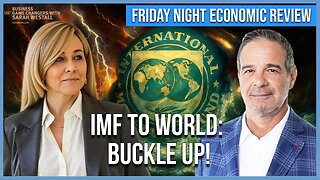 50:27
50:27
Sarah Westall
9 hours agoBig Banks Caught Rigging Market, IMF tells World to “Buckle Up” w/ Andy Schectman
43.6K19 -
 13:54
13:54
Degenerate Jay
16 hours ago $1.15 earned5 Best Superhero Movies To Watch On Halloween
22.9K5 -
 59:03
59:03
NAG Podcast
9 hours agoSarah Fields: BOLDTALK W/Angela Belcamino
39.4K9 -
 1:21:41
1:21:41
Glenn Greenwald
12 hours agoGlenn Takes Your Questions: On the Argentina Bailout, Money in Politics, and More; Plus: Journalist Jasper Nathaniel on Brutality and Settler Attacks in the West Bank | SYSTEM UPDATE #541
92K47 -
 3:10:08
3:10:08
Barry Cunningham
9 hours agoPRESIDENT TRUMP TO USE NUCLEAR OPTION? FOOD STAMPS END! | SHUTDOWN DAY 31
55.6K45 -
 1:06:56
1:06:56
BonginoReport
17 hours agoThe Battle Between Good & Evil w/ Demonologist Rick Hansen - Hayley Caronia (Ep.168)
105K39 -
 1:12:57
1:12:57
Kim Iversen
11 hours agoBill Gates Suddenly Says “Don’t Worry About Climate Change”?
94.1K69 -
 1:05:12
1:05:12
Michael Franzese
11 hours agoI Waited 50 Years to Tell You What Happened on Halloween 1975
47.6K20 -
 1:07:15
1:07:15
Candace Show Podcast
12 hours agoINFILTRATION: Charlie Kirk Was Being Tracked For Years. | Candace Ep 256
97.6K416 -
 9:17:19
9:17:19
Rallied
11 hours ago $4.26 earnedWarzone Solo Challenges then RedSec Domination
44K8
